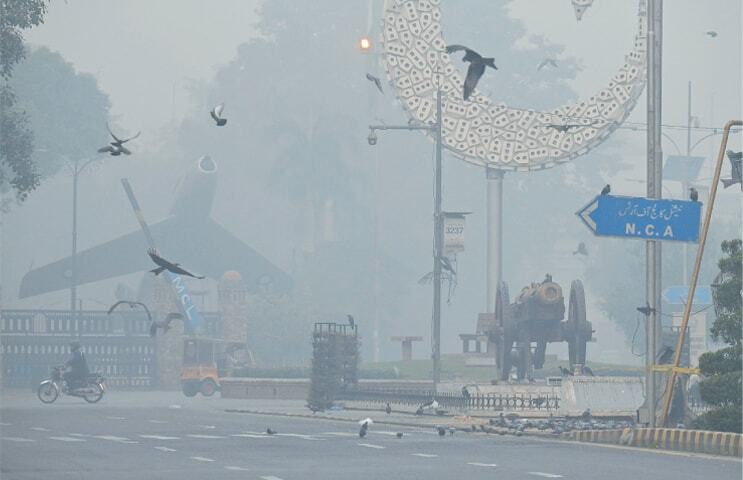
[ad_1]

• Marriyum says province will ask Foreign Office to take up cross-border pollution with New Delhi
• Second largest city shuts primary schools for one week, closure may be extended if ‘winds from India’ persist
• Minister says two more ‘green lockdowns’ on the cards, warns of harsher measures
LAHORE: As Punjab plans to request the Foreign Office to take up cross-border pollution with India, the provincial government has closed primary schools in Lahore this week, ostensibly to save children from the effects of hazardous air quality, exceeding levels deemed safe by the World Health Organisation (WHO).
“In the wake of deteriorating air quality index and in light of order dated 03.11.2024 issued by director general [of] Environmental Protection Agency Punjab while exercising powers conferred under… the Punjab Environmental Protection Act 1997, it is notified that all classes up to 5th grade in all schools (public and private) located in…Lahore shall remain closed for one week w.e.f 04.11.2024 till 09.11.2024 (Saturday),” said a notification issued by the provincial education department.
The closure will be extended if the situation does not improve.
In a press conference on Sunday, senior minister Marriyum Aurangzeb cautioned citizens about smog from India, saying winds would continue to blow towards Lahore for at least one week.
The provincial minister said easterly winds from Amritsar and Chandigarh were spiking the air quality index in Lahore to over 1,000 for the past two days.
Ms Aurangzeb, who holds the environment portfolio in the cabinet, said Punjab would write to the Foreign Office on Monday (today) to take up the issue with New Delhi.
“The wind from India towards Lahore…is taking the smog to dangerous levels and the wind is likely to sustain its direction for at least next week… People should take care of themselves by avoiding unnecessarily coming out of their houses. The elderly and children should be particularly careful…,” she said.
The government plans to use the week-long break to “conduct research”. “Authorities will use the week to conduct research, mapping, and studies to reassess and determine if extended school closures are needed,” she was quoted by the state-run APP as saying.
In response to a question, she said the government would write to the Foreign Office on Monday to approach Indian authorities for talks on joint efforts to curb smog.
A few days ago, Chief Minister Maryam Nawaz, at a Diwali function, hinted at approaching the Indian Punjab chief minister to put up a joint front against smog.
Regretting that “mischievous” people attempted to knit a conspiracy around the CM’s diplomacy talk, Ms Aurangzeb said one could not change the direction of winds and the issue of cross-border smog could be tackled only through negotiations. She cautioned against the politicisation of what she described as a matter of generational survival.
She warned brick kiln owners and transporters not to worsen the situation through emissions, saying the government could go for stricter steps, including temporarily closing down construction projects and imposing lockdowns. “Cases may be instituted against the violators, while they may also be arrested.”
According to the minister, construction in housing societies has not been banned so far but SOPs will be introduced to regulate the matters.
She said that all primary schools were being closed down for a week and the duration may be extended depending on the situation, adding that preparations for two additional “green lockdowns” were also underway.
The minister, in response to a question, said that arrangements for artificial rain were complete but the clouds required for the purpose were not available.
Listing the steps taken by the government to control smog, the minister claimed Chief Minister Maryam Nawaz Sharif had mobilised all departments over the past eight months to reduce smog.
Farmers are being provided with 1,000 super-seeders at a 60 per cent subsidy, with a goal to supply 5,000 units in total, she said, adding that these machines were also available on a rental basis at the union council level to discourage farmers from burning crop residue.
She added that 550 kilns had been closed, construction activities that failed to comply with SOPs were being restricted, and vehicles emitting ‘excessive’ smoke were also being impounded.
She further said the Environmental Protection Department had been restructured to increase its capacity. “Plans are in place to introduce an electric mass transport system,” she added.
According to AFP, Lahore, the city of 14 million people has been enveloped by smog, a mix of fog and pollutants caused by low-grade diesel fumes, smoke from seasonal agricultural burning and winter cooling.
The air quality index, which measures a range of pollutants, exceeded 1,000 on Saturday — well above the level of 300 considered “dangerous” — according to data from IQAir.
Breathing the toxic air has catastrophic health consequences, with the WHO saying strokes, heart disease, lung cancer and respiratory diseases can be triggered by prolonged exposure.
Pollution in excess of levels deemed safe by the WHO shortens the life expectancy of Lahore residents by an average of 7.5 years, according to the University of Chicago’s Energy Policy Institute.
According to Unicef, nearly 600 million children in South Asia are exposed to high levels of air pollution.
Published in Dawn, November 4th, 2024
[ad_2]
Source link






